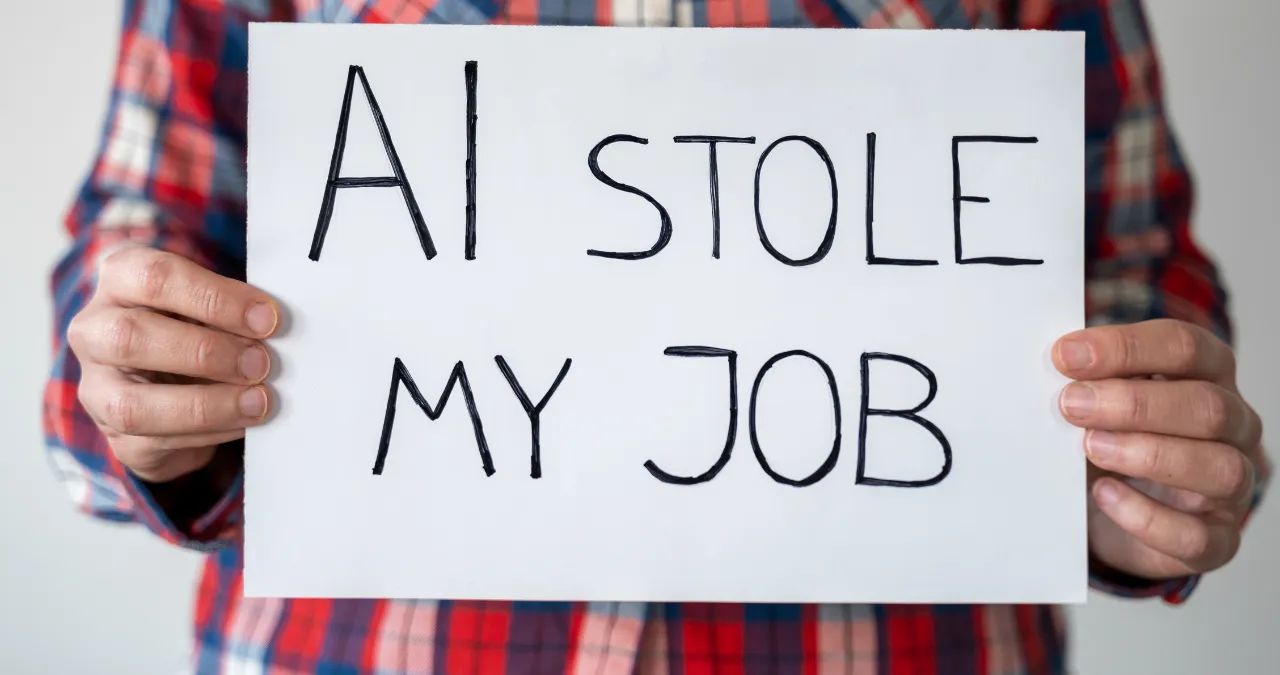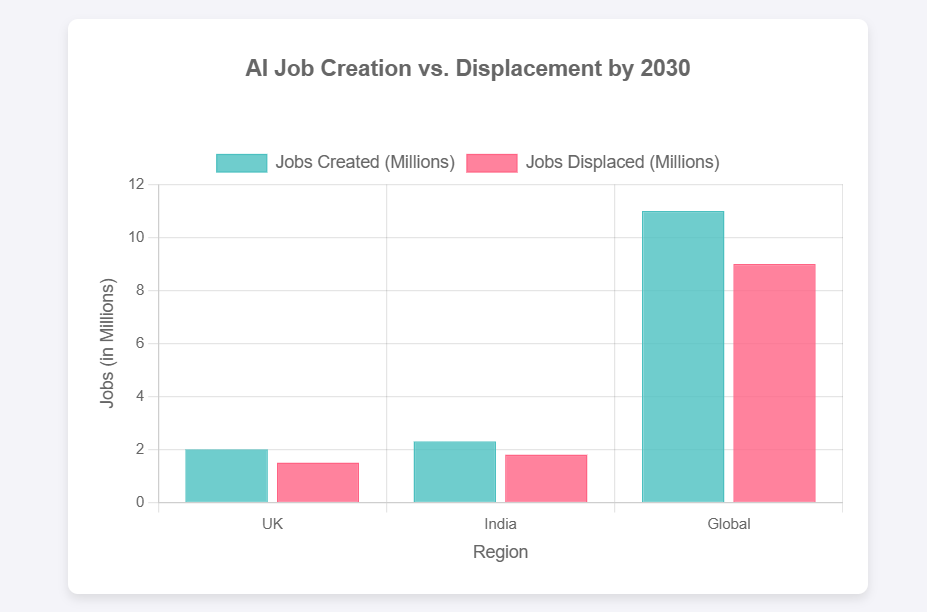A quiet revolution is happening in the busy tech centers of London and Bengaluru, fueled by AI’s Job Shake-up. Artificial intelligence (AI) is changing the way people work at a speed that is both exciting and scary. Take Raj, a software developer in Mumbai who spent years coding routine scripts—now, AI tools handle much of that, pushing him to learn machine learning to stay relevant. Or Sarah, a marketing analyst in Manchester, who used to have to sort through data spreadsheets for her job. Now, AI algorithms do the hard work, leaving her free to come up with creative strategies but requiring her to learn new skills in data interpretation.
This isn’t just anecdotal. As AI adoption surges globally, economies like the UK and India are at the forefront of a massive job transformation. According to recent reports, AI could boost productivity and add up to $4.4 trillion to the global economy each year. But there will be a shake-up because of this boom. Millions of jobs could be lost or changed, especially in IT, manufacturing, and services.
In the UK, which has a strong economy, AI could affect up to 60% of jobs. Automation is pushing people to do more valuable work. India has more workers than it needs, and by 2030, AI is expected to change more than 18 million jobs, mostly in manufacturing and retail.

But here’s the silver lining: while AI displaces routine roles, it creates new opportunities in emerging fields. The key to survival? Reskilling. This article looks at how AI is changing jobs in the UK and India, using real data from sources like McKinsey, the World Economic Forum (WEF), and Nasscom. We’ll look at the effects, talk about the skills that will be in high demand in 2025 and beyond, and give workers useful tips on how to adapt. This change could give you an edge in a world where AI is becoming more common, whether you’re a recent graduate or a professional in the middle of your career.
The AI Job Disruption in the UK: From Vacancies to Vulnerabilities
The UK has been a leader in AI innovation for a long time. TThe government has tried to make the world more open to new ideas, like with the AI Regulation White Paper. But this progress comes with some pain. McKinsey’s study shows that job openings in the UK fell by 43% from May 2022 to May 2025, going from 1.3 million to 0.7 million. This was in part because AI took over simple and entry-level tasks. Sectors like finance, manufacturing, and public administration are hit hardest.
Look at the WEF’s Future of Jobs Report 2025: AI and data processing technologies are likely to make 11 million new jobs around the world, but they will also take away 9 million. In the UK, this means a net gain, but there are some conditions. Data entry, customer service, and even some analytical jobs in the white-collar world are at risk of being automated. A UK government study on emerging technologies predicts productivity gains from AI but warns of job reorientation, where workers shift from repetitive tasks to those requiring human oversight, like ethical AI decision-making.

Real-world examples abound. Retail giant Debenhams launched AI skills academies for over 1,000 staff, focusing on data analytics and AI tools to prevent layoffs. AI chatbots are now answering customer questions in banks, which means fewer call center jobs but more jobs for AI trainers. The unemployment rate is still low at 4.1%, but more people are not working, which shows how important it is to learn new skills to reach an 80% employment rate goal.
Gartner’s findings support this: AI is changing the way people work in the UK. 94% of workers know about generative AI tools, but only 1% of businesses feel ready to use them. The message? Change or risk becoming obsolete.
India’s AI Boom: Opportunities Amid the Talent Crunch
India’s story is one of fast growth that has been slowed down by problems with scale. The AI industry is growing quickly, and by 2025 it is expected to be worth $28.8 billion, with a 45% compound annual growth rate (CAGR). Nasscom reports that half of India’s tech workforce is embracing AI training, but a yawning talent gap persists. By 2027, over 2.3 million AI jobs could open, yet only 1.2 million professionals may be ready, leaving a shortfall that demands urgent reskilling.
The WEF notes that 63 out of every 100 Indian workers will need training by 2030 due to AI disruptions. Agentic AI—autonomous systems that act like agents—is set to transform 18 million jobs by 2030, with manufacturing alone seeing 8 million shifts. In IT, once a job engine, AI is automating coding and testing, leading fresh graduates to pivot to non-tech roles like those at Chipotle equivalents.

Yet, positivity shines through. The Economic Survey 2025 highlights AI’s potential for productivity but stresses reskilling to absorb job losses in a labor-surplus economy. Initiatives like Duolingo’s “AI-first” approach in India emphasize upskilling without mass layoffs. Perplexity AI’s use in earnings calls shows how tools are enhancing, not replacing, human roles.
Case in point: Foxconn’s AI servers now surpass iPhone revenue, creating high-skill jobs in infrastructure. But as X threads warn, “zombie” startups are emerging after talent raids by giants like Microsoft and Meta, underscoring the competitive reskilling race.
Global Context: A $4.4 Trillion Boost with Reskilling Imperative
Zoom out, and the picture is clear: AI threatens 60-70% of employee time through automation but could add $4.4 trillion yearly to economies. Nearly 100 million people work in AI globally, yet reskilling is urgent. In the UK and India, this means bridging skills gaps in AI ethics, data science, and human-AI collaboration.
PwC’s 2025 Global AI Jobs Barometer reveals AI makes workers more valuable, even in automatable jobs. LinkedIn data shows 70% of job skills will change by 2030, with AI as the catalyst.
Skills to Survive: What to Learn in 2025
According to McKinsey, WEF, and LinkedIn, you should focus on these skills to do well:
- Generative AI and Machine Learning: Make models and put them to use. Demand for specialists is up 35%.
- Data Analytics and Science: Understand what AI says. Important for 30% more jobs.
- Cybersecurity: Protect AI systems from cyber threats. In India, it is growing by 67%.
- Sustainability Skills: AI for green tech, like energy optimization.
- Soft Skills: Communication and Critical Thinking: Human edges over AI.
- Cloud Computing and Robotics: For manufacturing shifts.
- AI Ethics and Governance: Ensure fair AI use.
Platforms like Coursera (UK/India) offer free courses; governments provide subsidies via SkillsFuture (UK) or FutureSkills PRIME (India).
Case Studies: Real Reskilling Wins
The Met Office’s push for more diversity in AI roles in the UK led to an increase in the number of women in these roles to 20%, which led to more innovation. Gurushala’s AI tool for teachers in India automates tests, giving teachers new skills for creative jobs. AI helped a hospital in Bengaluru cut manual billing in half, and the staff was able to be used for other things without having to let anyone go.
Looking Ahead: Thriving in the AI Era
AI’s job shake-up in the UK and India is inevitable, but so is the opportunity. By investing in reskilling—through personal initiative, corporate programs, or government schemes—workers can turn disruption into advancement. As Sam Altman notes, AI bubbles may burst, but the tech’s maturity promises $83 billion in AI chip revenue by 2027.
Start small: Audit your skills, enroll in an AI course, or experiment with tools like ChatGPT. The future belongs to those who adapt. In this AI boom, survival isn’t about fearing the machine—it’s about mastering it.
Related Stories: Why Tech Layoffs Are Rising in 2025 – And It’s Not Because of AI
Related Stories : OpenAI’s AI Agents Could Soon Replace Assistants, Coders, and Even CEOs


